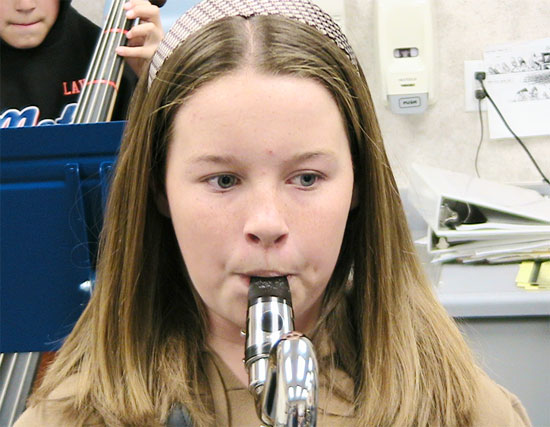The risk of infection when sharing steam instruments
A new study shows that the use of wood-based wind instruments has increased the risk of infection with saliva-borne diseases, especially in schools . The research results are published in the International Journal of Environmental Health Research by scientists.
Stuart Levy, a microbiologist working at Tufts University Medical School, in Boston, USA, teamed up with colleague Bonnie Marshall to test the presence of the common pathogen bacteria in the mouth over 20 Steam instrument made of wood. They found that the pathogenic bacteria existed on clarinets and saxophones for up to 3 days, longer than in the trumpet or the flute.
In another experiment, Levy and Marshall cultured a series of cocci, staph and other infectious pathogens on the wooden blades of wind instruments. As a result, staph and streptococci exist on the blades for several days. Other types of bacteria can last from 1 to 2 days, except for bacteria that cause tuberculosis, which lasts more than 2 weeks.

The shared use of wood-based wind instruments has increased the risk of infection
Bacterial diseases in saliva. (Photo: Elementaryband)
When scientists used an air compressor to bring bacterial contamination of saliva into the Clarinet, some bacteria once again lasted a few days. Staphylococci last up to 5 days inside the Clarinet.
The blades , the sound-producing part of the Clarinet, the saxophones and other wood-made instruments (not to mention the Flute), act as the main culprits of nourishing pathogenic bacteria . Most of the blades are made of large wooden trees. Because they are organic matter, sucking in moist air and helping bacteria survive longer than on metal surfaces of tools, Levy said.
Previous findings supporting this study, show: bacteria and viruses can exist on common contact surfaces, according to Owen Hendley, a pediatrician, working at the University of Virginia School of Medicine, USA. However, the new findings do not go so far as to establish a direct infection of bacteria from one person to another, through the sharing of wooden wind instruments, Hendley said. For example, the cold virus will need to find its way deep into the nostril or deep airway in the throat to infect new players.
Studies show that the best way to minimize the spread of bacteria in schools is to implement a clean-up policy of cleaning wooden instruments, completely by hand, after performing, Hendley said.
Levy said the new findings suggest that instruments, especially those with blades, should be cleaned immediately after use to minimize risks.
- Found ancient Chinese musical instruments
- Create steam using nanotechnology
- Sharing a bowl with a person with hepatitis B has been infected?
- Ancient instruments still play well after 1,700 years
- How to prevent flu infection on aircraft
- The smallest steam engine in the world
- Using medicine when being bitten by animals, insects burn
- Learning musical instruments is good for the child's nerves
- Steam train in Kingston
- Does the 'air conditioner' fan really regulate?
- Share online
- Obese patients are very at risk of complications after surgery
 Green tea cleans teeth better than mouthwash?
Green tea cleans teeth better than mouthwash? Death kiss: This is why you should not let anyone kiss your baby's lips
Death kiss: This is why you should not let anyone kiss your baby's lips What is salmonellosis?
What is salmonellosis? Caution should be exercised when using aloe vera through eating and drinking
Caution should be exercised when using aloe vera through eating and drinking